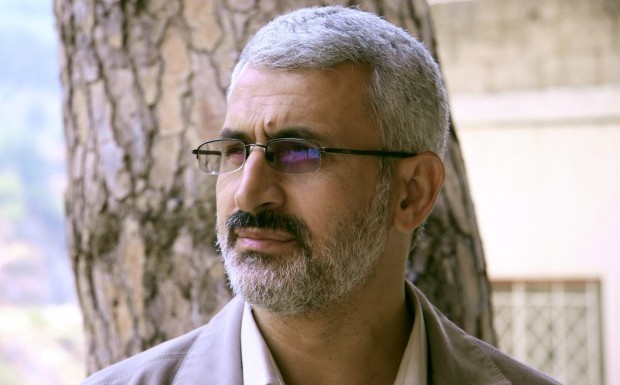
An undated picture made available by the Iranian Fars News agency shows Commander Hassan Shateri who was shot dead while he was travelling by road in Syria towards the Lebanese capital late on February 13, 2013. AFP PHOTO/FARS NEWS/EHSAN RAJABI
London, Asharq Al-Awsat—The killing of a senior Iranian commander west of Damascus highlights Tehran’s military involvement in the Syrian civil war.
General Hassan Shateri is the highest ranking Iranian Revolutionary Guard Corps (IRGC) officer to be killed outside Iran. His death is likely to renew debate within the Tehran leadership regarding the future of the Assad regime. Supreme Guide Ali Khamenei has vowed to prevent Assad’s fall. President Mahmoud Ahmadinejad, on the other hand, has tried to distance Iran from Assad in the hope of preventing the emergence of a new anti-Iran bloc in the region.
Shateri, who was 58-years old, was gunned down as he was driving south to Beirut after a week of consultations with Syria’s military leaders.
The gun-battle, during which a Syrian military escort failed to protect the Iranian general, happened Monday. But it was only yesterday when Shateri was transferred to his native city of Semnan, east of Tehran, that the death was officially confirmed.
According to Tehran sources two of Shateri’s aides were also killed in the ambush set up by rebels fighting the Syrian despot Bashar Al-Assad.
It is not clear whether the aides were also Iranian or Lebanese from the local branch of Hezbollah. The official media in Tehran claims that the attackers were agents of world Zionism, a cliché often used to point the finger at Israel for mishaps faced by Islamic officials.
The burial ceremony is scheduled for Friday with General Qassem Suleimani, Commander of the Quds (Jerusalem) Force heading the cortege.
The Quds Force, of which Shateri was a senior commander, is in charge of exporting the Islamic revolution. In practice, this means raising and leading pro-Iran militias and terrorist groups in countries of special interest to Tehran.
Shateri was sent to Lebanon after the mini-war between Israel and Hezbollah in the summer of 2006 to help rebuild the Iran-backed Shi’ite militia that had been shattered in the conflict. Shateri used the nom de guerre of Engineer Hessam Khosnevis with the title of Special Representative of the President of the Islamic Republic for the reconstruction in southern Lebanon where Shi’ites form a majority of the population.
According to Tehran sources, Shateri controlled several funds amounting to $200 million a year used to replace Hezbollah’s lost arsenal and rebuild its missile sites close to the demarcation line with Israel. He also launched a housing project that, over the past eight years, has helped over 600 Shi’ite families move into new homes.
As Special Representative of the IRGC, General Shateri sat on Hezbollah’s Central Command and helped shape the party’s policies with advice from Secretary-General Hassan Nasrallah.
Shateri’s key achievement was the creation of an inner-state in Lebanon. This consists of a set of communication networks, using fibre optic systems, built in parallel with the ones controlled by the Lebanese government. Thus, Iran has its own telephone, television, and satellite communication facilities across the Lebanon. The general also launched a real estate company to buy land, sometimes whole villages, from Christian and Druze minorities. The chunks of real estate thus obtained helped Iran establish territorial contiguity between the Bekaa Valley, on the Syrian border, with Beirut and thence the demarcation line with Israel in the south. This has created a seamless Shi’ite-majority entity in the very heart of Lebanon.
The business empire controlled by Shateri in Lebanon includes banks, shopping malls, hotels, transport companies, radio and television networks, newspapers, and travel agencies.
The general became a star in Tehran when he succeeded in ousting the pro-West government of Prime Minister Saad Hariri, replacing it with that of Najib Mikati with Hezbollah in effective control.
The anti-Assad uprising in Syria provided General Shateri with a new challenge. Over the past two years, he has helped recruit and train special units to fight for Assad. He brought in some 400 members of the IRGC from Iran to run the scheme with help from Lebanese Hezbollah fighters.
Shateri has also secured mooring rights for the IRGC’s navy in the Syrian port of Tartus where Iran is building military and civilian facilities.
It is not clear whether IRGC’s Iranian personnel have been directly involved in fighting against Syrian rebels. Tehran denies any involvement.
However, there is evidence that some of Shateri’s Lebanese men have died fighting for Assad in Syria. Anti-Assad forces claim that Iran and Hezbollah are both involved in Assad’s massacre of civilians in various parts of Syria.
